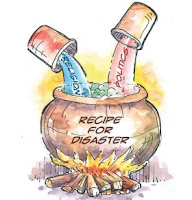"The Life of Brian"... I love this movie. I used to use segments of it when I taught RE is schools. I had it worked out perfectly so as to miss all the bits with swearing in it. Except for that one day, when I was standing at the back of the classroom, day dreaming a little, without the video remote control in my hand, and Brian tells everyone who is trying to follow him to "Fuck Off!!!" I hastily made a deal with the students that involved them going out from class a little early in return for not telling anyone that there had been swearing on the TV in the chaplain's RE lesson.
But I digress...
A few weeks ago, we were watching "Monty Python's - Almost the Truth: the lawyer's cut" on the TV and there was a great segment on the time John Cleese and Michael Palin had a TV debate with The Bishop of Surrey (I think) and Malcolm Muggeridge about the whether the film degraded Jesus or not. I couldn't find that particular segment online but I did find another Youtube video on it, and it is worth a look:
I love it... I'm totally on the side of the Python crew... I love the conclusion that they come to that they can't find enough in the teachings and life of Jesus to ridicule him. What they did come up with in the end was pure gold. It's hard to imagine the movie being anything else other than what it is...
Shalom...
But I digress...
A few weeks ago, we were watching "Monty Python's - Almost the Truth: the lawyer's cut" on the TV and there was a great segment on the time John Cleese and Michael Palin had a TV debate with The Bishop of Surrey (I think) and Malcolm Muggeridge about the whether the film degraded Jesus or not. I couldn't find that particular segment online but I did find another Youtube video on it, and it is worth a look:
I love it... I'm totally on the side of the Python crew... I love the conclusion that they come to that they can't find enough in the teachings and life of Jesus to ridicule him. What they did come up with in the end was pure gold. It's hard to imagine the movie being anything else other than what it is...
Shalom...















